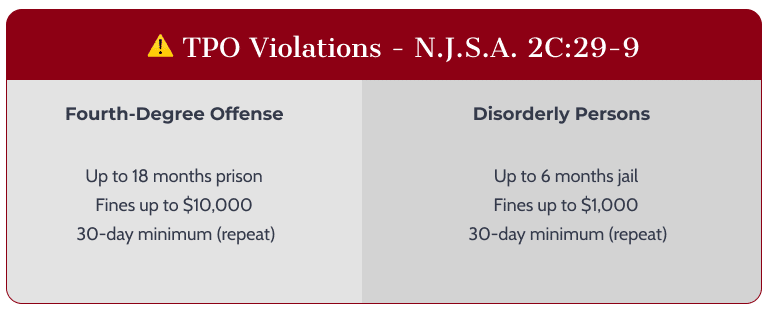Breaking Down Temporary Protective Orders in New Jersey
NJ Temporary Protective Orders (TPOs) for Stalking, Cyber-Harassment, Sexual Assault
 In 2023, New Jersey overhauled its system of protective orders by closing a loophole that previously left stalking and stranger-cyber-harassment victims without protection. Michele Albano’s leadership was instrumental in this legislative measure. His daughter had been terrorized by a stranger for years, with no pre-existing relationship with that stranger. No matter how egregious the situation was, then-current laws required a family or romantic relationship as a prerequisite for being eligible for a restraining order, leaving his daughter without coverage. Albano’s efforts bore fruit in the passage of S-1517, a measure that broadened the scope of protective orders for stalking and cyber-harassment victims, regardless of their relationship with the harasser (NJ.gov).
In 2023, New Jersey overhauled its system of protective orders by closing a loophole that previously left stalking and stranger-cyber-harassment victims without protection. Michele Albano’s leadership was instrumental in this legislative measure. His daughter had been terrorized by a stranger for years, with no pre-existing relationship with that stranger. No matter how egregious the situation was, then-current laws required a family or romantic relationship as a prerequisite for being eligible for a restraining order, leaving his daughter without coverage. Albano’s efforts bore fruit in the passage of S-1517, a measure that broadened the scope of protective orders for stalking and cyber-harassment victims, regardless of their relationship with the harasser (NJ.gov).
Based on this framework, the Victim’s Assistance and Survivor Protection Act (VASPA) that came into effect on January 1, 2024, further extended protections by enabling individuals to pursue civil protective orders against stalking and cyber-harassment crimes without the need for a prior sexual assault or domestic relationship. Victims under VASPA can file for a Temporary Protective Order (TPO) with the Superior Court, Family Division, without a prior criminal conviction or previously needed relationship with the offender (NJ.gov). This amendment recognizes that stalking and cyber-harassment can happen between strangers and can significantly affect victims’ safety as well as their health.
In this dynamic legal environment, our firm takes a central role in supporting victims amid the ins and outs of the TPO application procedure as well as against unsubstantiated accusations. We offer complete representation to individuals who wish to be protected under VASPA by walking them through the legal process as well as pushing for their rights in the courtroom. Our skilled lawyers make a firm commitment to availing victims of stalking as well as cyber-harassment their rights under the law, irrespective of their status with the offender.
What Protections Does VASPA Provide Under N.J.S.A. 2C:14-15?
The Victim’s Assistance and Survivor Protection Act (VASPA), N.J.S.A. 2C:14-15, entitles courts to make orders for emergency, ex parte Temporary Protective Orders (TPOs) where individuals need safeguarding against stalking, cyber-harassment, as well as related offenses. These orders can be made without notice to the suspected offender prior to where the petitioner can show “good cause” that involves an immediate need for action in order to protect the safety and well-being of the petitioner. The petition must contain sworn testimony or an affidavit establishing risk of harm, and the order will stay in place until a Superior Court judge enters a subsequent disposition.
Grounds for Obtaining a TPO in New Jersey
Under N.J.S.A. 2C:14-15, a victim may petition for a Temporary Protective Order based on the following grounds:
- Cyber-harassment: Engaging in a course of conduct through electronic communication that causes emotional distress or serves no legitimate purpose, including repeated unwanted contact via social media, text messages, emails, or other digital platforms.
- Stalking: Purposeful conduct directed at a specific person that would cause a reasonable person to fear for their safety or the safety of a third person, or suffer other emotional distress, including following, surveillance, or unwanted repeated contact.
- Non-consensual sexual contact: Sexual contact with another person without their consent, including any touching of an intimate nature performed without permission.
- Sexual penetration: Acts of sexual penetration accomplished through force, coercion, or without the victim’s consent.
- Lewdness: Engaging in lewd or indecent behavior, including exposing intimate parts of the body for the purpose of arousing or gratifying sexual desire under circumstances where the actor knows such conduct is likely to cause affront or alarm.
These grounds recognize that serious harm can occur between strangers and individuals without any prior domestic or dating relationship, expanding protection beyond the traditional domestic violence framework.
Not sure if you qualify for protection under VASPA or the NJ Domestic Violence Act? Use our Free Restraining Order Assessment Tool to evaluate your situation and understand your legal options. This confidential assessment helps determine whether you may be eligible for a Temporary Protective Order (TPO) or a traditional restraining order based on your specific circumstances.
Emergency Relief Available Under VASPA
Emergency relief under VASPA broadly incorporates some protections that differ based on the needs of the petitioner. No-contact orders do not allow the respondent to initiate or maintain any form of contact, while stay-away orders require the respondent to maintain a safe distance away from the dwelling place of the petitioner, workplace, or other frequent visitation locations. Prohibitions on communications deny the respondent permission to contact the petitioner by any means, including electronic communications. The court may also establish temporary custody or visitation orders for minor children where applicable, require temporary financial support in an effort to pay for residence or living expenses, and order the respondent to surrender weapons or firearms that they own. These relief measures provide immediate protection and lower the risk of further abuse.
At issuance, courts demand immediate service of the TPO for swift execution. A copy of the order must be sent immediately to the police department where the petitioner resides or is being protected, and the respondent must be served by the county sheriff without delay. Police departments, such as the State Police, receive notice to ensure broad notification and ease execution. Prompt notice to the authorities is vital to the success of emergency protections, as officers can quickly react if the order has been breached.
VASPA also allows for immediate appeal rights as well as plenary de novo hearings that provide the full petitioner as well as the respondent with a complete chance to make their case to a Superior Court judge. These hearings need not be limited to the record as it currently exists, and the judge is required on the record to set forth the reason for any changes or dismissals of the order. This ensures procedural fairness as well as judicial oversight so that the court can review the necessity as well as scope of the TPO without infringing on the legal rights of either party. In these methods, VASPA struck a balance between speedy protection as well as due process so that victims benefit from being granted swift legal relief without judicial impropriety.
From Application to Enforcement: How New Jersey’s Emergency TPO Process Works
Under New Jersey’s expanded protective order system, victims of stalking, cyber-harassment, and related offenses are able to access emergency protection through the ex parte Temporary Protective Order (TPO) process. This procedure is designed to provide immediate relief without requiring the victim to face the alleged perpetrator in court. In many cases, the application may be filed directly with the Superior Court, Family Division, or, in urgent situations, through municipal court judges after hours. The law recognizes that delays in access can heighten risk, which is why emergency relief is made available on an expedited basis, even if the victim is not physically present in the courtroom.
Remote applications are also authorized on the standard of “exigent circumstances,” which recognizes the circumstance that victims might not safely be able to come in person due to threats, being stalked, or fear of harm. Witness testimony may then be received under oath by phone or video, the applicant swearing the truth of the content of their application just as they would at in-person hearings. The requirement for sworn testimony maintains the integrity of procedures, but the ability of remote applications expands access for those in urgent need of this type of protection who find themselves in uninhabitable or isolated situations.
Once an order has been made by a TPO, the court should also send the order at once to law enforcement agencies for enforcement. Copies go directly to the local police department in the municipality in which the victim has sought refuge or where the victim is located, as well as the county’s sheriff’s office, for the purpose of serving the respondent. This accelerated forwarding system allows the police to promptly act when violations are made, as well as ensuring entry of the order into statewide data banks so the order may come to the attention of all the state’s officers.
In certain situations, personal service on the respondent is not possible quickly, creating complexities for the enforcement process. Substituted procedures for service may be authorized by the courts, intended to strike a balance between due process requirements and the necessity of safeguarding the victim promptly. For instance, the service may be conducted by leaving the order at an actual residence or workplace or by some other method authorized by the court. Such procedures are handled carefully so as to provide the respondent with sufficient notice but avoid unnecessary delays or repeated confrontations by the perpetrator. The system is so designed as to allow for both speediness and fairness in order to achieve the dual purposes of safeguarding victims as well as the constitutional rights of the respondent.
Your Rights at a Final TPO Hearing: Defense Strategies and Options
Final protection order hearings under New Jersey’s legal framework are conducted with urgency. Using the preponderance of the evidence standard, they are scheduled within ten days of the issuance of a Temporary Protective Order (TPO). The hearing allows the petitioner and respondent to present evidence, witness testimony, and legal arguments that support or deny the reasons for the order. The court evaluates the evidence, requiring that the claims be more likely true than not. This standard shapes the strategy of both parties, as the focus is on demonstrating credibility, consistency, and corroboration of events rather than proving guilt beyond a reasonable doubt.
Respondents who are charged under a TPO have various possible bases for defense that do not interfere with constitutional protections like due process, the right to counsel, and the right to offer evidence. Defenses include challenging the veracity of the petitioner’s claims or the credibility of their witnesses. Lawyers may also show that the denounced behavior doesn’t constitute the statutory definition of stalking or harassment. Respondents may assert the communication was misinterpreted.
Both the respondents and the plaintiffs maintain the right to appeal or seek alterations after a final order. Appeals will normally be filed in a superior court, where a petitioner or respondent can seek an extension or other modification of protective measures due to a change in circumstances or the presentation of new evidence. Judges will weigh the continuing risk, history of compliance, and mitigating circumstances in warranting modifications. This appeal and amendment procedure ensures protective orders can be adaptive yet still allow remedies to correct a perceived error or re-examine the usefulness of constraints.
Agreed outcomes can also be pursued in some instances as alternatives to a complete final order. Agreed boundaries between parties can settle disputes. For example, a petitioner may request no communication by text or phone, but approve of email contact. This can be particularly helpful when parties maintain a regular personal or professional contact.

Understanding TPO Violation Penalties Under N.J.S.A. 2C:29-9
In New Jersey, violating a Temporary Protective Order (TPO) is a serious offense under N.J.S.A. 2C:29-9, classified as criminal contempt of court. An entity that willfully or knowingly violates an order of a court, including a TPO, may be charged accordingly. The charged offense will rely on the nature of the violation. In situations where a violation involves conduct that constitutes a separate offense or disorderly persons offense, it becomes a fourth-degree offense that can carry a sentence of up to 18 months in a state prison as well as a fine of up to $10,000. In other cases, the offense becomes a disorderly persons offense that can carry a sentence of up to 6 months in jail as well as a fine of up to $1,000.
A TPO violation or a recidivist violation requires a mandatory minimum 30-day jail sentence, regardless of the offense level. The jail time required reflects the interest by the state to uphold protective orders as much as it seeks to deter repeat violations.
Intersection of Civil TPO Proceedings with Criminal Charges
TPO actions are civil cases that seek relief for individuals against harm, but breaches of these orders can result in criminal prosecution under N.J.S.A. 2C:29-9. The two-pronged system thus enables immediate civil relief by grant of a TPO as well as subsequent criminal prosecution for violation of the order. A client can be issued a TPO restricting contact with an alleged abuser, and if the violator breaches this order, they can be charged with a crime with a consequent possibility of jail time as well as penalties. The overlap thus guarantees both immediate relief as well as punishment for violation.
Collateral Consequences: Central Registry Recording and Background Checks
 Fourth-degree TPO violations that result in criminal convictions are added to the state’s central registry. These records can be released during background checks by employers, licensing boards, and other authorities. A criminal conviction can significantly impact an individual’s employability, professional licensure, and other opportunities, as it can be perceived as an indicator of character and credibility.
Fourth-degree TPO violations that result in criminal convictions are added to the state’s central registry. These records can be released during background checks by employers, licensing boards, and other authorities. A criminal conviction can significantly impact an individual’s employability, professional licensure, and other opportunities, as it can be perceived as an indicator of character and credibility.
Statutory Mandatory Law Enforcement Notification and Statewide Enforcement
When a TPO is issued, the law enforcement agency must be notified immediately so that the order can be executed across the entire state. Notifying police officers in the whole state enables them to be aware of the protective order and enforce it when the terms are being violated. In this kind of scenario, where the restrained seeks contact or approaches the protected, law enforcement can intercede in the moment with full knowledge of the legal system as well as the need for enforcement.

Get Experienced TPO Representation Today and Protect Your Rights
The Tormey Law Firm has years of experience serving both applicants and respondents in Temporary Protective Order cases across New Jersey. Our firm’s lawyers fully comprehend the system of protective orders in the state as well as the interspersal between civil and criminal cases under VASPA. This experience enables us to offer balanced strategic advice when a client seeks immediate protection or faces accusations of inappropriate behavior.
Our firm provides comprehensive representation throughout the TPO application process, from consultation to disposition. We guide our clients through the preparation and filing of applications, evidence gathering, and emergency ex parte hearings, ensuring every step is thorough and mindful of both the client’s safety and their legal rights. Our firm develops tailored defense strategies on behalf of respondents who dispute unsubstantiated allegations, seeking a just disposition.
The Tormey Law Firm offers consultation services designed to meet urgent needs, including 24/7 emergency availability for time-sensitive matters and a free initial case evaluation to help clients understand their options and potential legal pathways. The firm’s service areas include assistance with TPO applications, immediate representation for emergency ex parte hearings, courtroom advocacy for final hearings, defense against false or exaggerated allegations, and post-hearing remedies such as appeals or modification of orders. Through these services, clients benefit from experienced guidance, strategic advocacy, and continuous support throughout the protective order process. We represent clients in Temporary Protective Order and VASPA matters throughout New Jersey, including Newark, Jersey City, Paterson, Trenton, Camden, Atlantic City, Morristown, New Brunswick, Woodbridge, Toms River, Princeton, and communities across all 21 counties. If you need immediate assistance with a TPO application or are facing allegations under VASPA, contact us at (908)-336-5008 for a free and confidential consultation with an experienced lawyer.
Legally Reviewed By:
Travis J. Tormey, Esq.
Criminal Defense Attorney | New Jersey



